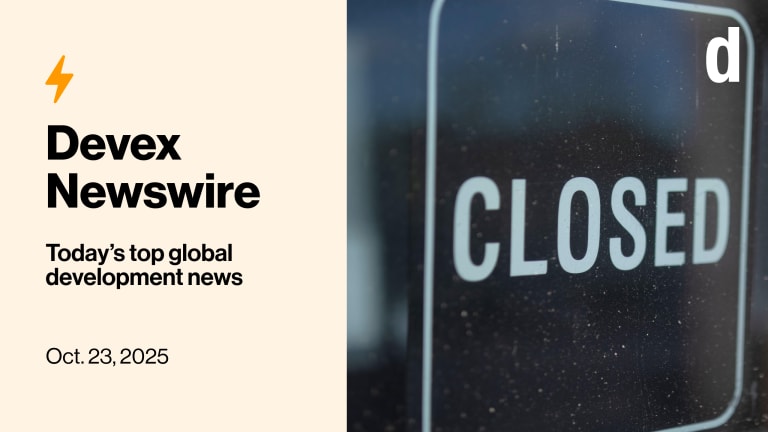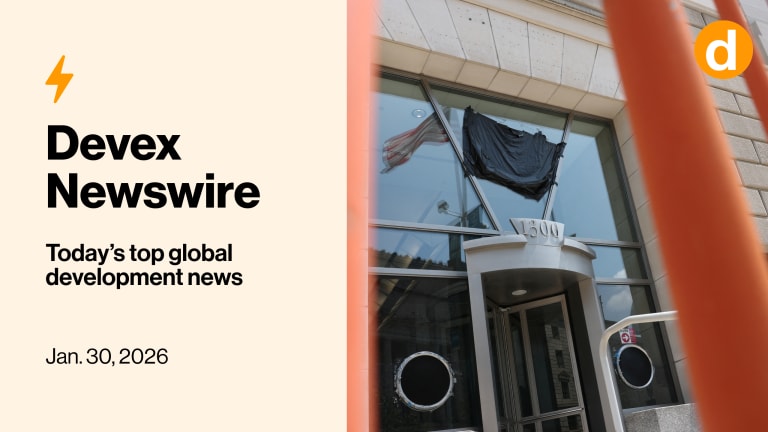
The struggle for U.K. aid has suddenly turned into a fight.
This is a preview of Newswire
Sign up to this newsletter for an inside look at the biggest stories in global development, in your inbox daily.
Some serious hitters, including former U.K. Prime Minister Theresa May, added their names to a list of Conservative MPs backing an amendment designed to force a much called for vote on the U.K. aid budget cuts in Parliament in just a few days time — yes, just before G-7.
• The rebels tabled the amendment in a week Parliament was out, causing a further headache for an already overstretched government. If the vote goes ahead and the pro-development MPs win — as they claim they can — it would be a huge boost for a battered U.K. development sector, which has suffered major defeats over the past year.
• It’s unclear what the consequences of the amendment would be. Some worry there are many ways such a win could backfire and say the amendment should be tighter.
• Conservative MP Andrew Mitchell, leader of the rebellion, has been scathing about the Johnson government’s approach to aid — but has always been careful enough in his criticism to give the government room to maneuver into a dignified retreat. It’s possible the government could make some concessions on aid before Monday arrives to get the amendment withdrawn and avoid a big kerfuffle in G-7 week.
• But Prime Minister Boris Johnson is a notorious gambler, and he may decide to call the rebels’ bluff. A victory would all but guarantee the government could do what it liked to aid and development policy, and could allow it to push ahead with even more radical changes.
Read: UK government faces surprise vote on aid cuts
+ Follow all the ongoing cuts with our U.K. aid tracker
Cyber fears
“It’s an arms race and we’re completely outgunned.” — Dianna Langley, senior director of engagement at the Net Hope consortium
The largest-ever coordinated cyber attack on development agencies could be a “watershed moment” for the sector, experts tell Devex following the news that suspected Russian hackers attacked more than 150 NGOs at the same time.
Seeing even USAID, a government agency with access to government protections, get hacked has shocked tech and development experts — with Langley warning the attack is “a wakeup call for all of us” that attacks are growing more sophisticated.
Hostile environment
Resource scarcity exacerbated by climate change is adding to gender inequality in myriad ways, causing surges in child marriage and domestic violence, reports Kelli Rogers.
Ahead of World Environment Day Saturday, experts tell Devex the link between environmental problems and gender-based violence is becoming too significant to ignore much longer. But adapting to a heating climate and protecting nature requires significant behavioral change.
Devex Pro: How climate change and gender-based violence are connected
Ain’t no sunshine
A lawsuit was brought against the U.S. International Development Finance Corporation by three environmental groups who claim the impact investors have broken the law by deciding not to hold open meetings mandated under the Sunshine Act.
“Congress intended this new agency to be open to the public and follow the Sunshine Act,” says Bill Snape, senior counsel with the Center for Biological Diversity, one of the groups behind the lawsuit. “While the [former President Donald] Trump administration used the agency to favor its special-interest benefactors like the oil and gas industry, our lawsuit says ‘no more.’”
+ For more content like this, sign up for Devex Invested, the weekly newsletter on how business, social enterprise, and development finance leaders are tackling global challenges.
Uno, dose, tres
The U.S. has promised to share 80 million doses of COVID-19 vaccine — and yesterday, it announced the allocations for the first 25 million shots.
• 19 million of the shots will be distributed through COVAX: 6 million to Latin America and the Caribbean, 7 million to Asia, and approximately 5 million to Africa.
• Another 6 million will be sent directly to several countries — including Mexico, Canada, South Korea, and Ukraine — as well as to United Nations front-line workers.
• The U.S. is one of the largest vaccine donors, but health experts say there is still a dire shortfall in jabs for lower- and middle-income countries, especially given India’s pivot to preserving its supply within its own borders as it struggles with a massive virus surge.
Read: US allocates 19M doses of first tranche of vaccine donations to COVAX
In other news
Greece has begun vaccinating asylum-seekers at government-run facilities on the islands of Lesbos, Chios, and Samos. [AP]
The world failed to meet its "90-90-90" goal for tackling HIV/AIDS, as the number of new infections tripled the set target of 500,000 in 2020. [The Telegraph]
U.S. President Joe Biden will soon nominate three new people to senior positions at the U.S. State Department and USAID, including a key post for refugee issues. [Foreign Policy]
Sign up to Newswire for an inside look at the biggest stories in global development.









